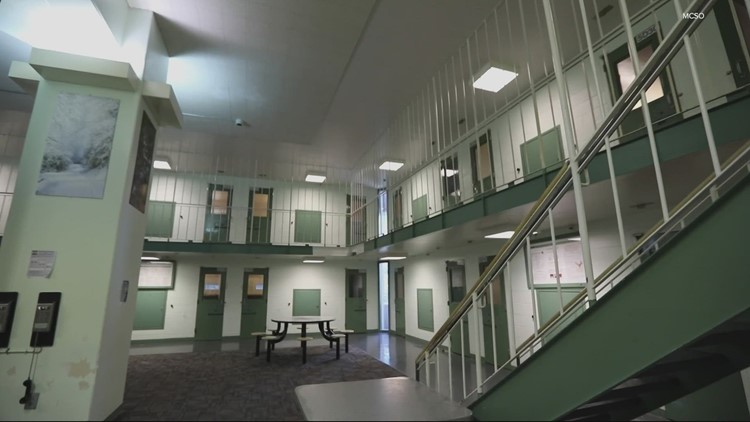PORTLAND, Ore. — Conditions at Multnomah County's two primary jails continue to suffer from long-term staffing shortages, a lack of public defenders and deteriorating facilities that are long past their useful lifespan, according to a recently released grand jury report.
The report, which is a yearly requirement under Oregon law, was compiled by seven jurors who toured Multnomah County jail facilities in early October and interviewed staff, inmates and other stakeholders.
Featuring prominently in the 2024 report was the Multnomah County Detention Center, which is the county's high-security facility located within the downtown Justice Center building. The smaller of the county's two adult jails, it handles both intake and release of all inmates in county custody.
The detention center, the grand jury report notes, was built in 1981 with a planned lifespan of 20 years. It's now 43 years old and beyond attempts to keep up with routine maintenance as the building's infrastructure continues to deteriorate.
Inside the facility, the grand jury noted water damage and reports of repeat water line failures, non-functional lights and cells "out of order" due to electrical or plumbing issues. The jail also has a history of elevators frequently failing, with the previous grand jury in 2023 reporting that several jurors were briefly trapped inside an elevator when it got stuck.
A facility maintenance log at MCDC showed 245 open tickets, some going back as far as February 2022. Most, however, were from this year. Open tickets included issues with 33 different toilets that were either leaking, not working or barely working.
Witnesses told the jurors that an evaluation of MCDC put the cost of critical system updates at $100 million — and a full upgrade at nearly $250 million.
The Multnomah County Inverness Jail, the lower security facility built in 1988, is likewise approaching the end of its useful life, the report noted. However, the grand jury found it to be in a "satisfactory state of repair" compared to MCDC.
According to the grand jury, these annual reports have been recommending that the county plan to replace these facilities since 2017, noting their seismic vulnerability. But jurors were "appalled" to find out that the Multnomah County Sheriff's Office and their partners have only recently started talking about replacement.
"MCSO and its stakeholders have known for many years that MCDC did not meet the needs of the corrections system and was past the planned useful life of the building," the report states.
The grand jury's recommendation envisioned a new jail as one facility to take the place of these two existing structures, cutting down on costs from transportation between the two and the duplicate costs involved in operating both.
Between the two facilities, MCSO last reported a combined capacity of 1,485 people, with funding to actually house 1,117. Before the pandemic, the facilities were running very close to capacity — a problem that has since returned with a vengeance.
Currently, the county's newest jail is not a jail at all, nor is it the county's. In 2004, Multnomah County finished construction of the 525-bed Wapato Jail. But a combination of falling crime rates and a lack of funding to operate the new facility meant it never opened. It was eventually sold off and now hosts the Bybee Lakes Hope Center instead.
Compounding issues
Like the age of the facilities, other problems plaguing Multnomah County's jails have been growing for years. Short staffing and a lack of public defenders, while coming from different sources, work together to compound nearly every other issue that the local criminal justice system faces.
The grand jury report states that staffing shortages are "nearing a crisis point," weighing heavily on the morale of current employees and degrading standards of care for inmates. Both MCSO's corrections and law enforcement divisions, the report noted, are operating well below minimum staffing levels.
"Hiring and staffing challenges have been mentioned in previous CGJ reports but county leadership has failed to make progress in addressing the staffing crisis," the grand jury said. "The pace of hiring must increase for both HR and corrections staff."
Currently, the void in staffing is being filled by corrections staff working mandatory overtime hours.
And unless recruitment steps up significantly, the problem of staffing and its crunch on capacity is only likely to get worse. Though Multnomah County has kickstarted a drug deflection program, Oregon's recriminalization of simple drug possession means that the arrests of those who are either ineligible or have failed deflection could result in more jail bookings. Similarly, Portland's move to arrest and book homeless people camped in public who refuse offers of shelter — something Sheriff Nicole Morrisey O'Donnell resisted — could result in additional bookings.
But the most consequential strain, one noted in the grand jury report, is that the Multnomah County Presiding Judge will tighten restrictions on pretrial detentions in 2025. Whereas someone caught dealing fentanyl might previously have been eligible for release immediately after booking, they'll now be held in jail until their first court appearance.
Those problems dovetail with another not necessarily within Multnomah County's power to change. Oregon has been struggling with a shortage of public defenders, largely due to the state's failure to offer pay competitive to attract attorneys willing to do the work.
"For the past 31 months, many defendants that qualified for indigent defense have not received an attorney to assist in the defense of their cases," the report states. "This has resulted in a lack of justice due to cases stalling for extended periods while indigent defendants await the appointment of counsel, cases being dismissed over prosecutor objections for a lack of counsel within a reasonable amount of time, and delayed court proceedings."
The public defender shortage has cascading effects on Multnomah County jails, as the corrections system either houses criminal defendants whose court proceedings face repeat delays, or in some cases, has to book defendants whose cases were dismissed only for them to reoffend.
And the jail staffing shortages can complicate problems for overworked criminal defense attorneys as well.
"Defense attorneys have an ethical obligation to review all discovery with their clients," the report states. "If they are unable to meet with their clients due to restricted or cancelled visitor hours or phone hours, the (defendants) may have further delays in the resolution of their cases. The longer defense attorneys represent a particular client, the fewer additional clients they can take, which leads to fewer available attorneys to appoint to new indigent defendants."
And all of this, including Multnomah County's aging correctional facilities, is directly contrary to the ostensible shift away from retributive justice and toward rehabilitation since the early 2000s. Since the COVID-19 pandemic, in-custody job opportunities have been curtailed and programs for education, counseling or substance use treatment have only slowly started to return. The grand jury report called offerings at MCDC in particular "grossly insufficient."
Despite that, the grand jury found the MCSO's programs manager and staff to be passionate and innovative in trying to work with inmates, with hopes to expand.
"While (inmates) are under the care of MCSO, there is an opportunity to rehabilitate individuals, reduce the impact of trauma that occurs by nature of incarceration, address social determinants of health, provide services that will improve outcomes, and reduce recidivism," the report says. "It is crucial that funding these 11 services be prioritized to lower rates of homelessness as well as treat mental illness and SUD while improving public health and safety and reducing intergenerational trauma."
Stopgap funding
In late October, Sheriff Morrisey O'Donnell sounded the alarm about staffing and capacity issues at the county jails, threatening to result in forced releases.
A few weeks later, the county board approved an additional $965,885 for the sheriff's office and its Human Resources unit to be used exclusively for recruitment, hiring and retention.
But as with previous attempts to shore up the sheriff's office, the funding allocated in November is not a long-term solution. It will apply for the last half of the fiscal year, ending in June 2025. Morrisey O'Donnell signaled that she would need to ask for even more funding in the next budget cycle in order to meet the agency's needs.
In a letter replying to the 2024 grand jury report, the sheriff acknowledged many of the issues they raised and agreed that it was time to plan for a feasibility study on the county's deteriorating correctional facilities.
"We must ensure that our facilities are safe and physically sound, not only to meet constitutional mandates, but also have the infrastructure to offer rehabilitative programs and reentry connections," Morrisey O'Donnell said. "To that end, the continued use of an aging high-rise and splitting the incarcerated population between two different buildings is not the most fiscally responsible."



